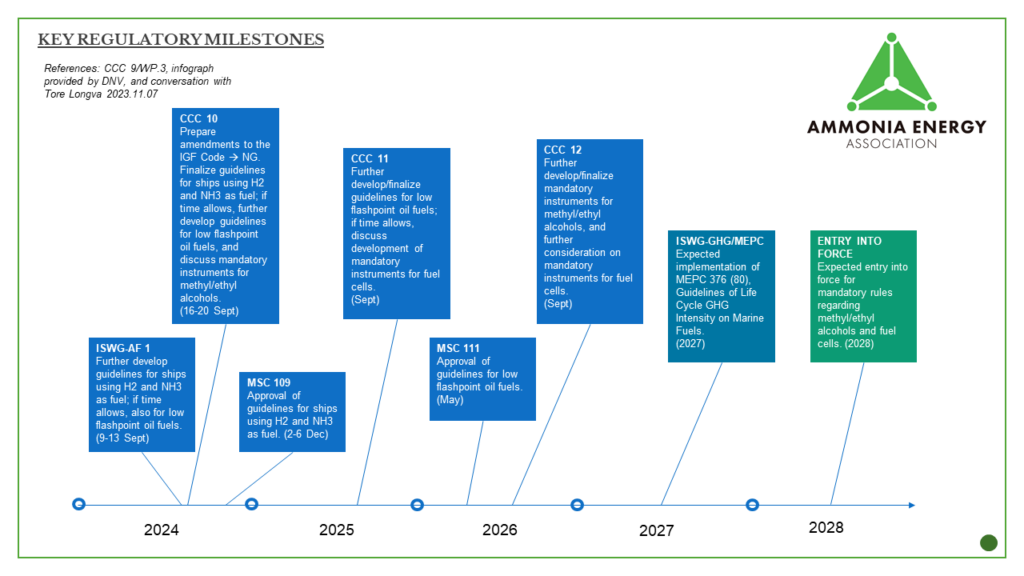IMO progresses on guidelines for ammonia fuel
By Julian Atchison on November 07, 2023
Provisional timeline for approvals

Following a meeting of the IMO Sub-Committee on Carriage of Cargoes and Containers (CCC) in late September, the IMO reports “significant progress on the development of draft interim guidelines for the safety of ships using hydrogen and ammonia as fuel”. The CCC will convene twice next September (an intersessional group plus its annual scheduled meeting) to finalise the draft guidelines, which will then be approved by the Maritime Safety Committee (MSC) in early December 2024.
Taking into account the urgency of providing guidance to Administrations, shipowners and the industry at large on the safe use of hydrogen and ammonia as fuel, and in support of IMO’s emission targets, the Sub-Committee agreed to convene an intersessional working group from 9 to13 September 2024, immediately prior to CCC 10 (subject to approval by the Maritime Safety Committee (MSC) at its 108th session and endorsement by the Council), to finalize the guidelines. Time permitting, the working group will also be invited to further develop the draft interim guidelines for ships using low-flashpoint oil fuels.
From “Progress on safety guidelines for hydrogen- and ammonia-fuelled ships”, IMO (5 Oct 2023)
The CCC is also set to revise existing recommendations on entering enclosed spaces onboard vessels, noting that a “profoundly distressing” number of lives has been lost in recent years. The use of hydrogen & ammonia as fuel has obvious implications here.
Looking forward

For some perspective, it was only in June this year that the MSC approved Interim guidelines for the use of LPG as a fuel, issuing circular MSC.1/Circ.1666. The circular (along with the international IGF Code) is intended to form the basis for the design, construction and operation of vessels using LPG as fuel. In May 2024, the MSC is due to approve an update to these guidelines, with the CCC in the process of preparing advice on the use of LPG cargo as fuel. A similar progression pathway could well eventuate for ammonia fuel, especially given the rise in interest in ammonia-fueled, ammonia-carrying vessels. Beyond 2024, guidelines for LPG and other low flashpoint fuels will be finalised and approved in 2026.
We need only look to the methanol space for an indication of the potential speed at which regulations for ammonia fuel will be developed. In late 2026, methanol fuel and fuel cells are on the agenda at the IMO as so-called “mandatory instruments” are developed. In 2028, mandatory rules for methanol fuel & fuel cells will enter into force, marking the completion of a regulatory process that began with the issuing of interim guidelines in 2020.
Learn more at our 2023 annual conference in Atlanta next week, where we spend an entire workshop session dedicated to discussing The Pathway to a Code for Ammonia as a Maritime Fuel, chaired by Conor Fürstenberg Stott. Speakers from the Methanol Institute, UMAS and more will explore the pathway forward for ammonia fuel, drawing on recent regulatory developments.
Building on significant progress in 2023
Another of the IMO’s key bodies – the Maritime Environmental Protection Committee or MEPC – made headlines this July when a historic roadmap to net-zero for the global shipping industry was agreed to by member states. The outcome of that meeting was to ramp-up the IMO’s decarbonisation strategy – by 2030, the total greenhouse gas emissions of global shipping must be at least 20% lower than the 2008 baseline level, accelerating to an at least 70% decrease by 2040, followed by net-zero emissions in 2050. A well-to-wake approach for lifecycle analysis of maritime fuels was also agreed to.
Both the MEPC and MSC consist of representatives from all IMO member states, adding weight to these 2023 outcomes. The CCC is open to all member states but is designated a Sub-Committee, ultimately meaning that its advice & work plan must be approved at the following session of the senior body.